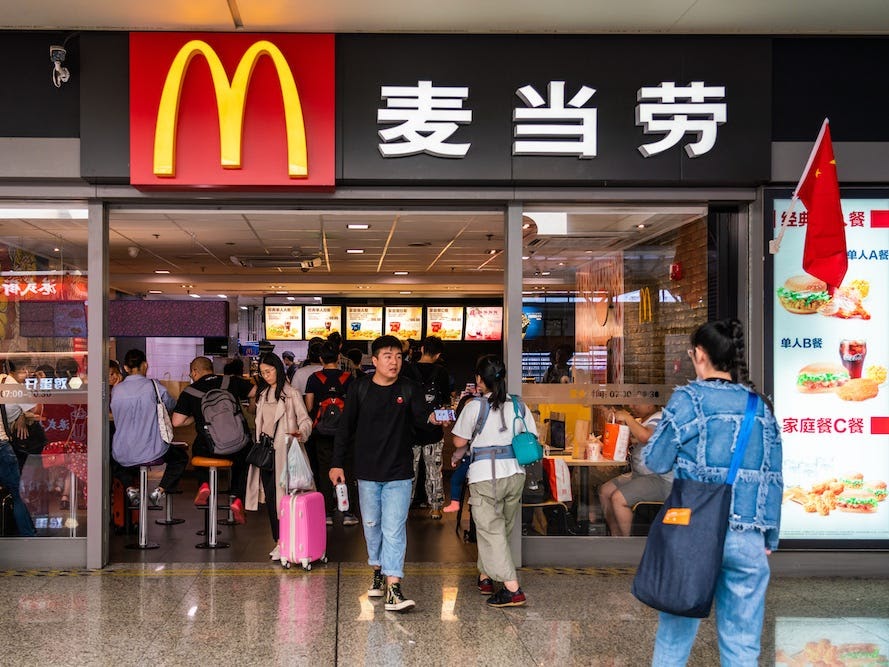McDonald’s in Shenzhen stops giving out disposable utensils. Customers are not happy.
McDonald's was not the only major chain in Shenzhen to make single-use foodware a target of elimination. But unlike other companies such as Starbucks, which provide reusable alternatives such as metal straws and stainless steel forks for customers dining in, McDonald's does not offer reusable utensils for in-restaurant meals.

Looking to receive free plastic cutlery with a takeout order from McDonald’s? If you are in Shenzhen, a new reality has set in. A recent mandate issued by the local government of Shenzhen, Guangdong Province, has ordered restaurants across the city to stop providing single-use foodware for free. But while the latest push to reduce plastic waste has drawn swift praise from environmental experts, some customers are complaining.
As part of a larger piece of legislation concerning dumping and disposal for households and businesses in Shenzhen, the measure went into effect on September 1. But it wasn’t until last week, when local McDonald’s restaurants began to charge for disposable utensils, that the issue was brought to the forefront of national attention.
According to the Shenzhen Express (in Chinese), on September 15, McDonald’s in Shenzhen started imposing a fee of 0.5 yuan ($0.15) on every order that requests disposable utensils, such as wooden chopsticks and plastic forks. The fee complies with a Shenzhen city government directive that prohibits restaurants and other food-service businesses from handing out single-use cutlery for free.
McDonald’s was not the only major chain to make single-use foodware a target of elimination. Bubble tea brand Heytea, Chinese breakfast chain Yonghe King, and coffee chain Starbucks also put in place similar policies in Shenzhen last month.
But unlike Starbucks, which provides reusable alternatives such as metal straws and stainless steel forks for customers dining in, McDonald’s does not offer reusable utensils for in-restaurant meals. When interviewed by the Hongxing News, a representative from McDonald’s China said (in Chinese) that there was no need to make reusable utensils available in stores because most of its food can be consumed with bare hands.
That explanation, however, has not gone over well with critics who argued that by taking away options of reusable foodware, McDonald’s is putting the onus on customers to reduce waste while ignoring its own duty to find environmentally friendly alternatives to disposable utensils.
“If I’m expected to pay the extra 0.5 yuan for plastic cutlery, what has McDonald’s done for the environment?” a Weibo user wrote. “I’m cool with the policy if it makes its food cheaper. How am I supposed to eat a sundae with fingers?” another one commented.
Some also raised questions about whether McDonald’s was trying to cut labor costs at the expense of customers’ convenience. “The simplest solution is to hire more people to wash dishes. But apparently, that’s the last thing it would consider,” a Weibo user wrote.
In an online poll (in Chinese) conducted by Caijing.com, roughly 60% of the 59,000 respondents spoke against the measure, saying that McDonald’s needed to reduce the price of its food to make the new policy justifiable.
Meanwhile, supporters of the measure argued that the McDonald’s rule may seem aggressive and troublesome to some consumers, but it’s a necessary step to motivate a culture of reuse. When talking to the Southern Metropolis Weekly, Dù Huānzhèng 杜欢政, the director of the Circular Economy Research Institute of Tongji University, likened the policy to China’s 2008 ban on retailers distributing plastic bags free of charge. “Essentially, the two measures are based on the same method, which is to force consumers to use something for a longer period of time by adding inconvenience to their lives. This is how we can cut down waste fundamentally,” Du explained (in Chinese).
Shenzhen’s mandate on single-use utensils is consistent with a national initiative to cut the amount of plastic waste cluttering the environment and harming wildlife. China is not only the largest producer of plastic products, accounting for about 29% of worldwide production in 2018. It is also a major consumer, with nearly three-quarters of its plastic waste being dumped in poorly managed landfills.
To tackle its plastic problem, China instituted a ban on scrap imports in 2018. Earlier this year, Beijing intensified its anti-plastic campaign by introducing a new set of guidelines targeting domestic production and use of single-use plastic items. The rules state that non-biodegradable plastic bags will be banned in major cities, such as Beijing and Shanghai, by the end of this year. Other sources of plastic garbage, such as single-use straws and containers, are expected to be entirely eliminated nationwide by late 2025.






